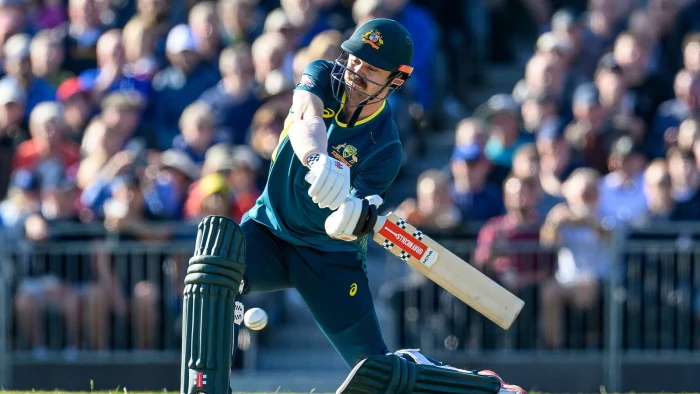Ashes 4th Test review: Series a wash but Bazball shines bright

The big screen displays the abandonment of day five of the fourth LV= Insurance Ashes Series test match at Emirates Old Trafford - July 2023
A rainy Sunday in Manchester spelled a premature end to a thrilling Ashes series but Ben Stokes and Brendon McCullum's mission to breathe new life into Test cricket is still going strong.
That's that, then. What was supposed to be the greatest Ashes series ever ends not with a bang but a whimper.
It's hard not to feel a crushing sense of loss and disappointment at what's been taken away from us. It doesn't make you a whingeing bloody Pom to feel that nearly two days of solid rain denying a near-certain England victory is a rubbish way for the Ashes to be settled.
There are almost no five-Test series any more. Think what it takes - including weather that behaves its damn self - for one to arrive at its final Test with the score 2-2. That's what's been stolen from us, and if you can't rely on Manchester weather to play ball then, really, can you trust and rely on anything at all in this mixed-up world?
If the Ashes were on the line, with a retreating and weary Australia seeking to hold off the comeback of all comebacks from an England team on the crest of the wave, next week at The Oval would have been something truly extraordinary. It would have dwarfed anything from 2005 whatever the result.
You don't have to be an England fan to mourn what we've all lost here. Australia can and should celebrate their victory. The luck they got from the conditions here has not been with them throughout the series - or at the toss - and they have won more of the bigger and most decisive moments of the series. They will also know that escaping via the rain here was their best hope. The vibes would have been almost unstoppable.
The direction of travel in the series over the last couple of games has also been clear. The return to the side of Chris Woakes and Mark Wood has energised England just as Australia started to look weary.
It's amazing how quickly that can change. England came into the series undercooked and underprepared. Australia came into it battle-hardened and ready after the WTC final. A month later, England look fresh and Australia look knackered.
Pat Cummins had a bad game, peaking on day two on Thursday when he had what must rank among the worst all-round individual days any player has been through. Dismissed by the first ball of the day, bowled like a drain, dropped a sitter at midwicket and captained a Test side like someone who'd never seen cricket but had the rules vaguely explained to them by a distracted child.
Australia's weakness and weariness was clear from the team selection. Todd Murphy is an inexperienced international spinner, but very clearly a capable one. Leaving him out at Old Trafford of all places was an admission of guilt on Cummins' part; an admission that he has neither the aptitude nor confidence to captain a spinner who doesn't have 120 caps and can thus pretty much captain themselves.
Playing for a draw
Picking eight batters and just three frontline bowlers was a tacit admission that Australia saw their best route out of this series now as to scramble to a rain-assisted draw in Manchester and take the last Test out of the question.
In doing so they put a quite alarming amount of faith in the accuracy of long-term UK weather forecasts, which is not something a healthy or confident team would do. The forecast and their lengthened batting line-up just about held up, and for Australia it is job done.
Ignore the faux-sheepishness from Cummins and co at the end. They will be delighted. Having picked a team to play for a draw, they immediately had the problem all such teams face: they played for a draw.
That old cricketing cliché about how positive thinking will also improve your defence, because you'll defend positively with nimble footwork and clear thoughts also applies to a whole team. When Plan A is a draw, everything becomes muddled.
While a skittish hit-out-before-I-get-out innings from late-career David Warner got Australia off to an ostensibly positive start, their batting on the first day was filled with uncertainty. A team in a better place would have put the series to bed that day in just about the best batting conditions Australia have had all series long. They did not, with a string of players getting in and getting out without finishing the job.
With the ball, Australia were a shambles. Cummins himself understandably looks the most exhausted of anyone and the afternoon session on day two, in which England scored 178 runs in 25 overs against barely token opposition, was one that left Australia with only one way out.
The weather provided it. Australia were damn lucky. There really is little to say about Australia's performance in this game, because there scarcely was one. The uncontrollable rain was a fitting end in a way to a Test that always seemed to be happening to Australia. They were passive participants, passengers no longer in control of where they ended up.
But only here was that true. Only in this Test. And this is a series.
Remarkable effort
England were beyond magnificent for three days here. That they came so close to concocting a victory against a very good team on a flattish pitch in a game curtailed by a third was a remarkable effort. Grumblings about the lack of an early day-three declaration miss the point: it would only have allowed Australia to force England to bat again and give them the chance to slow the game right down.
At best England might have got themselves another 10 overs with the ball - and, what, one more wicket? - at a cost of 80 runs. Whichever way you slice it, they were always going to need more time than day four and five ultimately allowed.
Allowing Jonny Bairstow to extend the innings to its fullest left England, in the end, with 30 day-four overs to take six Australian wickets. It's hard to see how any other approach would have produced a more favourable outcome.
It wasn't enough, and while England will know they could have done no more here to continue their comeback they will know (even if they will not say) that series-costing errors were made at Edgbaston and Lord's.
While publicly at least there remains a refusal to concede Bazball has any smoothable rough edges, the tacit acknowledgement comes in the cricket that is played. Being 2-0 down with three to play forced the issue, but England's cricket has not been so wilfully determined to prove its own aggressive, entertainment-at-all-costs point in the last two games. In the last two games, England's first thought has been "How best do we win this game?" Astonishing as it sounds, it's hard to make that claim about what went down in either Birmingham or London.
Ultimately, this match and with it the series, achieved something pretty unusual. Both teams achieved their stated aims. Australia have retained the urn. England have proved again that Bazball works. Bazball took them to victory at Headingley, and only Bazball could even have created the possibility of victory at Old Trafford.
Changing the game
And here's where Ben Stokes' greatest achievement as England captain may come. When he says that winning the Ashes was less important than creating a team that will go down in history, you believe him. It sounds grandiose, but his plans for this team go beyond the Ashes. That can only be healthy for English cricket, which spends altogether too much time fixating on the Ashes at all costs.
Everything is either the Ashes, or a response to the last Ashes, or preparation for the next Ashes. If Stokes can rid England of this mindset it will be a greater achievement even than convincing vast swathes of people that reverse-sweeps and switch-hits are fine and legitimate shots for Test batters to play.
There are ironies here. Bazball has had one of its greatest games end in its least acceptable outcome: a draw. And Bazball must now be turned again on the Aussies in full-blooded pursuit of victory at The Oval and… a draw.
Like 2019, the series if not the destination of the urn remains alive going to the final game, but beyond a 2-1 scoreline there really is little resemblance.
Four years ago, a delighted Australia thrashed England here and were demonstrably the better side. They over-celebrated retaining the urn and forgot all about winning the series. They were desperately poor at The Oval and England won easily.
England will be just as keen to win again this time, but face a very different Australia. There is no chance Australia will be as complacent or distracted now as they were four years; what's different, though, is whether that will be enough.
Four years ago, it was a shock when England won that final Test to pinch a series draw they scarcely deserved. Four years on, it would be a shock if they did not win a final Test to secure a series draw they richly deserve.
But whatever happens at The Oval is less than it might have been. England will righteously curse the bad luck from the weather this week, but we mustn't forget everything that has gone before in this series that brought us to this point. The weather is one of those things and beyond the control even of Bazball - one cannot simply vibes away the rain. England's unpreparedness for this series and the ensuing mistakes in the first two Tests are where thoughts should eventually lead.
Choices were made that ultimately had far more impact on the result of this series than a day and a half's Manchester rain.


